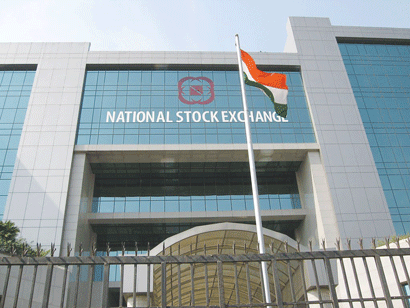Goa is abuzz with excitement as vintage bike and car owners, users, collectors and fans are decking […]

NSE CHITRA SCAM DUE TO DIGITALIZATION!BY ARVIND PINTO
Feb 26- Mar 04, 2022, FINANCE February 25, 2022EXCHANGE: In addition to Dalal Street which is managed by a consortium of stock brokers, the National Stock Exchange is run by the Union Finance Ministry with the appointment of the managing director being decided by the government of the day.
BY ARVIND PINTO
The digitalization of sensitive institutions like the stock exchanges, including the government-managed National Stock Exchange, has given way to mega scams like the one in which Chitra Ramkrishna claims that she was being guided by a Himalayan Rishi through Email….
IN the digital age that India is slowly moving into, there are several methods where those who play the game, become rich at the cost of the public at large.
With much of our financial transactions going digital, be it banking, stock trading, mutual fund buying and even education and retail buying, why even dating, there are several pitfalls that one must ensure we do not get trapped in. Let’s take the recent National Stock Exchange issue that is presently being investigated by several government agencies.
For most old timers, buying of stocks and shares was the old cry system at Dalal Street, where jobbers shouted their bids in the well. There were many pitfalls in the old system, but then with the movement of trading on terminals, the National Stock Exchange came into existence in the year 1992.
Over the decades the NSE has grown to become one of the top bourses in the world thanks to the volume and variety of assets that are being traded on this exchange. One of the unique selling points of the NSE is that its total operations in the market are digital, and with high speed servers and algorithms designed to track several lakhs of trades per second, the NSE is probably one of the best bourses in the world.
NSE TRANSFORMATION
OVER the decades the NSE has played a dominant role in transforming the capital market in India. It has been able to bring trading to several smaller cities of the country, enabled a seamless transfer of securities between buyers and sellers and has eliminated the use of paper by digitalization of the entire process. Further, the screen based trading gives to the layman an apparently transparent system of both information and trading. But for every system there are several who attempt to get better than what the system can offer. Here is one instance! The curious case of the CEO of the NSE, Chitra Ramakrishna.
Chitra Ramakrishna was a bright Tamilian girl brought up in Mumbai, who started out as a chartered accountant. Starting out at the finance division of the IDBI and then moving into the SEBI, she was handpicked by the late SS Nadkarni to set up the National Stock Exchange.
Bright Chitra Ramakrishna was indeed, since she was involved in the drafting of the legislative framework of the Securities & Exchange Board of India (SEBI), the country’s capital market regulator. At the NSE Ramakrishna was responsible for several key initiatives. She was instrumental in setting up the Pan India VSAT network that helped the NSE to spread its footprint to many smaller towns in the country.
She is also credited with helping to facilitate screen-based trading, providing retail trading to small time investors. In one of her addresses, she is known to have said that “Techology is a tiger” and she was the one who facilitated its use in the organization to build NSE — it became not only the topmost bourse in the country, but one of the premier bourses, the seventh largest in the world in terms of market capitalization of one trillion.
Ramakrishna retired from the NSE and was given a golden handshake of Rs44 crore! Behind the story of her glory and capability there are several aspects of her working that are now being questions, snippets of which are slowly trickling in the public domain! Let’s look at some of these:

CO-LOCATION FACILITY
TRADING at the NSE is totally digital. In January 2010, the NSE began offering a co-location facility to its members. Thus, members could place their servers at the exchange’s premises in return for a fee. This facility allowed them faster access to the buy or sell orders that were being disseminated by the exchange’s trading engine. The term co-location is used when the brother’s computers are located within the vicinity of the NSE’s servers. The computers of brokers were programmed with algorithmic trading, where they were in a position to execute thousands of orders in less than a second.
Privileged with instant information, these brokers were able to execute traders in a split second, helping to corner stocks of their choice and reap profits multifold as compared with the retail investors, who had to wait for the prices to be released on the NSE portal. For many in the know, money is to be made by split second decisions where one has inside information as compared with the rise or fall of stocks as seen on the portal. Thus, it was these privileged brokers who had access to this co-location who were able to derive an unfair advantage over the others who were not in such an advantageous position.
The nexus between the NSE and certain brokers came to the forefront with the co-location scam. There were several brokers who were privileged to share this co-location facility with the NSE. Some of these brokers who have been identified were Alpha Grep, SMC Global, Motilal Oswal, Religare Securities, JM Global and OPG Securities.
PROFIT IN MILLIONS
ACCORDING to the CBI investigation, the last mentioned broker in collusion with certain NSE officials, was the first to access the NSE servers and it is reported that the firm has earned close to Rs250 million in profit.
In 2010, NSE began providing co-location facility without the approval of SEBI under the name of Direct Market Access (DMA). This facility was given to certain Foreign Institutional Investors (FII). While the ostensible policy was to increase FII participation in the Indian stock markets, this sharing of privileged direct information helped these FII to reap humongous profits.
The information sharing helped a few brokers to rig the market, moving stocks up and down according to their strategy, with the ultimate aim of making profits for themselves and their clients. It was rumored that both Chitra Ramakrishna and her then boss Ravi Narain were also involved in actively helping the broker lobby.
Another scan that has surfaced in NSE trading is the adjustment entries that brokers would do to help their clients. After trading closed the NSE would keep a small window of half an hour to enable brokers to correct any mistakes made during trading. While this procedure was to help correct mistakes made during the course of trading, this opportunity was taken by unscrupulous brokers to enter fictitious trading, which gave their clients entries of either losses or gains according to their requirements. Many of these fictitious trades were settled in cash, where brokers extorted commission for helping clients.
ANAND SUBRAMANIAM
ANOTHER controversy
that Chitra Ramakrishna encountered at the NSE is her bringing in of Anand
Subramaniam, a middle-level manager at
Balmer Lawrie, who was appointed as group operating
officer and adviser to the managing director. Without the approval of the remuneration
committee Subramaniam was appointed by Ramakrishna and this was resented by
those working in the NSE.
But one of the most intriguing aspects of the Ramakrishna investigation is the E-mails which have surfaced of her having been guided by a Yogi mediating in the Himalayas! It is he who is said to have guided her in many of her decisions at the helm of NSE. The identity of this mysterious “yogi” is yet to be known! It is to the spiritual powers of the Yogi, to which Ramakrishna attributes her success. In a country where spiritualism plays an important role, the influence of a “godman” cannot be ruled out
Chitra has long since resigned from the NSE, but the trail of investigation still continues to determine whether there was any wrongdoing on hard part. With numerous leads from whistle-blowers and those who were not happy with her way of functioning, investigative agencies are probing into the matter. However, it is to her credit that she did bring the NSE from its fledgling status, to one of the premier bourses in the world!















